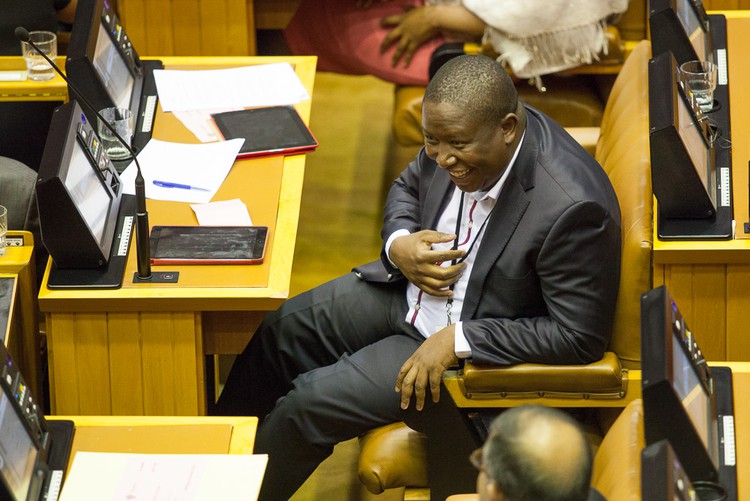Judge scolds EFF for repeatedly wasting courts’ time
“The laxity with which the EFF acted is unexplained … the extreme urgency was entirely self-created and unwarranted, it inconvenienced the court, the participating party and other litigants”
EFF leader Julius Malema. Archive photo: Ashraf Hendricks
- Acting Judge Ncumisa Mayosi has scolded the EFF for the way it has treated the courts.
- The EFF brought an urgent case against the Minister of Finance, but failed to submit papers properly or timeously, wasting an enormous amount of everyone’s time.
- Mayosi pointed out two previous occasions when the EFF did the same thing.
- This comes against a backdrop of enormous pressure on the courts, with massive backlogs and large numbers of late reserved judgments.
- She dismissed the EFF’s application and awarded costs against the party.
A pattern of time-wasting, haphazard litigation by the Economic Freedom Fighters (EFF) is at the centre of a Cape High Court judgment. The political party has been criticised for bringing “extremely urgent” court applications which unnecessarily take judges away from other, deserving, matters.
Acting Judge Ncumisa Mayosi, sitting with judges Nathan Erasmus and Lister Nuku agreeing, lambasted the EFF. She pointed out that this was a third application in which the party had brought hopeless cases, on unreasonable timelines.
The matter before the three judges was a challenge by the EFF to the announcement by the Minister of Finance to an increase in the general fuel level during his budget speech in late May 2025.
The increase was to come into effect two weeks later.
That application was dismissed with costs on 3 June 2025. Mayosi handed down the reasons for this, this week.
She gave a detailed breakdown of when the “urgent” application was launched and the timelines imposed by the EFF for the filing of further affidavits.
This, after the party sent three letters of demand to the minister. The first two were withdrawn because they contained “technical and computational material errors”.
After the court challenge was launched, the minister was given only one day, a Friday, to consider the application, form a view on its merits, procure lawyers, consult, take advice and file an answering affidavit.
The EFF said it would file its replying affidavit by 5pm on that Saturday.
On Friday, the Judge President of the division had to urgently constitute a full court (three judges) to hear the matter on Monday, 3 June.
One judge had to postpone a running criminal matter. The three judges then had to reserve themselves over that weekend, constantly on the lookout for papers, which never came.
Mayosi wrote that it was unsurprising that the minister was unable to comply with the deadline and his 75-page affidavit was only delivered on Sunday, 2 June. The EFF’s final affidavit was submitted to court on Monday, 3 June.
Mayosi said while she accepted that the issue raised had to be addressed urgently “the issue I have with the EFF’s approach relates to when the urgency arose”.
“It arose on 21 May, as soon as the minister made his announcement. It addressed its letter of demand to the Minister five days after that announcement having bungled two previous attempts.
“It then delivered papers in this application a whole eight days after the announcement and two court days before the hearing. These timeframes were unreasonable in the extreme.
“The laxity with which the EFF acted is unexplained. In my view, the extreme urgency was entirely self-created and unwarranted, it inconvenienced the court, the participating party and other litigants.”
Mayosi said this was not the first time the party had acted in this manner, citing two other applications in which the EFF had launched on an “extremely urgent basis” against the Chairperson of the Powers and Privileges Committee.
In one, a judge had to be removed from another matter in order for a full bench to be constituted. In the other, judges hearing motion and urgent courts, had to be redeployed.
And both applications were found to be fundamentally defective. The EFF’s conduct was “frowned upon”. The cases were dismissed with costs — punitive in at least one instance.
“It is hard to resist the conclusion that this manner of litigating, with the prejudices and unfairness inherent in it, both for the opponents involved and other litigants in this division, and the judges hearing those matters, has become a pattern for the EFF,” Mayosi wrote.
She described several “fatal flaws” in the latest application which the party had already been called out for in previous matters, concluding that there was no legal basis for the application.
She dismissed the EFF’s application and ordered the party to pay the minister’s costs.
Support independent journalism
Donate using Payfast

Don't miss out on the latest news
We respect your privacy, and promise we won't spam you.
© 2025 GroundUp. This article is licensed under a Creative Commons Attribution-NoDerivatives 4.0 International License.
You may republish this article, so long as you credit the authors and GroundUp, and do not change the text. Please include a link back to the original article.
We put an invisible pixel in the article so that we can count traffic to republishers. All analytics tools are solely on our servers. We do not give our logs to any third party. Logs are deleted after two weeks. We do not use any IP address identifying information except to count regional traffic. We are solely interested in counting hits, not tracking users. If you republish, please do not delete the invisible pixel.

